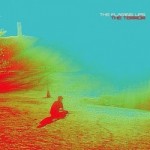Lumerians : Call of the Void

On third album Call of the Void, Lumerians pursue a hybridization of the synthetic strains of both punk and progressive rock. They occupy a similar space as Black Moth Super Rainbow, a noted influence, as well as Flaming Lips’ work for the past decade and a half. They bend prog rock’s sonic tendency toward gazing deep into the spiraling chaos void of star and soul, all tunneling synthesizers and flashes of modulated sound like open-eyed visuals, with late-’70s synth-punk’s tendency toward the same except in more minimalist shell. There’s a sonic similarity here to Chrome, Tangerine Dream and Suicide, as well as a dash of Silver Apples, oscillators on full blast.
Which is another way of saying the reference notes are fairly surface-level. That isn’t to say the songs on Call of the Void are bad; they avoid sounding like pure pastiche or absent-minded retroism, have a heft of sincerity and enough sonic goodies to justify time with the record. And given the laxness some of those aforementioned groups have had in regards to releasing quality material as of late, Lumerians are fulfilling a niche that is going underserved at the moment. The timing of the release of this record is auspicious for the group; indie rock is more or less in the lurch right now, with no major sound or scene for it to coalesce around, and any smaller bands that might have crowded this type of sound are gone.
The record does a fine job of conjuring a void-state, a pleasant and harmless psychedelic cosmos. It lacks some of the fervent dissociative teeth that modern psychedelia is typically striped with, avoids the kind of subtle disquieting menace that underpins especially the heavier end of modern psych, instead focusing on a quivering blankness. This isn’t a critique; there is still an intensity in the performances, the drums splitting the difference between mechanical linear beats and a human roughness to the performances, keeping the cosmically-inclined synthesizers tethered to earth. These songs do not throttle off into the ether with the intensity of Hawkwind at their most ferocious, retaining a sense of the bodily, but seem to deliberately evade a distinct and explicit emotionality, savoring instead a formless intensity.
It’s hard to imagine this effect coming through at a polite volume on satellite speakers or crummy, tinny laptop speakers. This is still rock music, after all; better for headphones, big speakers or car stereos, and always loud. The overriding sensation here, in that womb of sound, is less one of direction and more one of presence, not the reaching-out of emotion or reaching-in of memory and association, but the nameless locality of being-here-now. Which is a strange and pleasant place for psychedelia to aim itself, less at the cosmos of inside and outside and more on the strangeness of being a body in time in the world. The record is dedicated to a friend of the band who lost their life in the Ghost Ship warehouse fire that tragically took so many in Oakland in 2016. Death seems to inform the record, not in terror or ecstasy but instead the renewed sense that we are alive, here, now.
Riffs hang in instrumental repetition, gesturing not outward with a big and evocative progression nor digging in with moody timbres or overt danceable grooves. The measured lines of the instruments, balanced well against each other, feel more like a math equation working itself out, organic enough to feel composed by human hands yet interdependent enough to dislocate a sense that these songs are supposed to build to something beyond themselves; the focus is on interplay, extemporaneous. Their time developing two full-length improvisational records paid off here; the performances no longer feel secondary to some greater meaning, instead having enough body to call attention to themselves for their own sake, in the body- and psyche-erasing manner that quality rock music can.
In the wake of the void, after the experience of death and grief, what remains is not the world or the people in it but merely the cogito, the thinking and sensing mind, suspended in time and space, located temporally and geographically. Lumerians’ Call of the Void comes from there; the any-place/any-when that becomes the no-place/no-when, the self-contradicting erasing paradox, which in grappling with the profundity of death emerges as mindless contemplation of the body and perceiving mind trapped here, now, with only great and terrible gulfs to surround.
Similar Albums:
 White Hills – Walks for Motorists
White Hills – Walks for Motorists
 Flaming Lips – The Terror
Flaming Lips – The Terror
 Black Moth Super Rainbow – Panic Blooms
Black Moth Super Rainbow – Panic Blooms
Langdon Hickman is listening to progressive rock and death metal. He currently resides in Virginia with his partner and their two pets.

